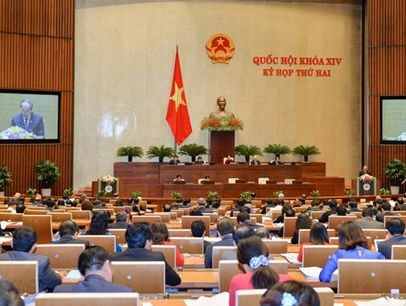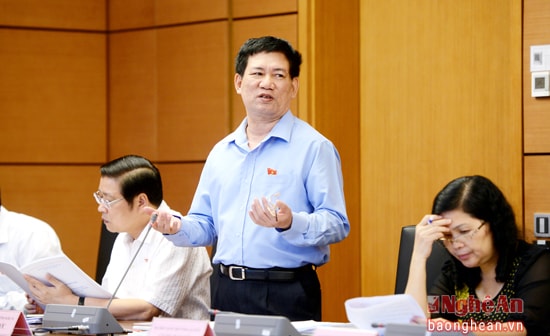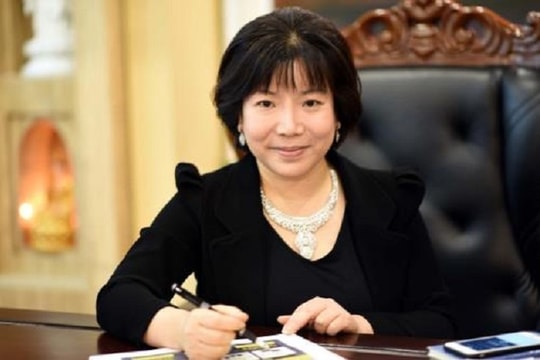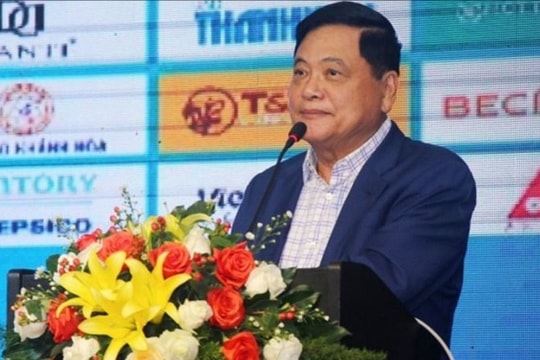'Do not apply public-private partnership when building state headquarters'
(Baonghean.vn) - Continuing the working program of the 2nd Session, on the morning of October 31, under the direction of Ms. Giang Pao My - Member of the Party Central Committee, Head of the National Assembly Delegation of Lai Chau province, National Assembly deputies of 4 provinces including: Tra Vinh, Hoa Binh, Lai Chau and Nghe An discussed in groups about the Draft Law on management and use of state assets (amended).
 |
| The 2nd session of the 14th National Assembly. |
The delegates all agreed with the viewpoint that a centralized administrative area is a complex of working headquarters planned and built in a concentrated area for the use of many agencies, organizations and units. At the same time, they agreed with the draft law to continue to maintain the management of working headquarters according to the current decentralized model, but suggested reviewing and supplementing regulations on measures and sanctions for agencies and units that use headquarters for the wrong purpose, invest wastefully, and do not match the function and usage needs.
In case the state budget allocated for investment in office headquarters does not meet the requirements, it is allowed to apply the form of public-private partnership investment to mobilize social resources together with the State to invest, satisfying the need for office headquarters serving state management work.
Comments on the draft law stated that investment in building office headquarters can be invested in the form of public-private partnership (PPP). However, according to delegate Ho Duc Phoc, the State Auditor General (delegate of Nghe An delegation), this provision should be removed from the draft.
"I'm afraid that this regulation will be easily exploited and unsafe in the future. Imagine a state agency like a family. We build our own house, but if we invite others to build it and then give them a part, and we live together, I'm afraid that with the headquarters of a state agency, it will not ensure dignity and confidentiality, and will be exploited in the future. Some prime land plots have started to call for businesses to invest, so that state agencies can have 2 or 3 floors, and 6 or 7 floors to sell to outsiders. It is not excluded that the officials with authority to resolve the issue will benefit from this," Mr. Phoc expressed.
 |
| Delegate Ho Duc Phoc spoke at the discussion. |
The delegate said that as a state headquarters, the public-private model should not be applied. "If you have money, build big, if you don't have money, build small" to ensure stable operation of state agencies.
State Auditor General Ho Duc Phoc also proposed removing provisions allowing state agencies to use offices, headquarters, halls, vehicles, etc. for rent.
"I think we shouldn't, because if we do that, we will be chasing after benefits. If we chase after benefits, when making the estimate, the project should only have 2 floors, but people will make it 5 floors, instead of 2,000m2but estimate 5,000 m2for rent. If rented, how will this money be used later? It will not be safe during use," Mr. Phoc stated his opinion.
Delegates from Nghe An province also shared their views on "what is State property?". Mr. Phoc said that for BOT projects, when the State Audit Office audited a number of projects, both the Ministry of Planning and Investment and the Ministry of Transport issued documents objecting to the audit, stating that these were private assets, not public assets.
Accordingly, BOT stations are privately invested and can only be considered public assets after their term expires, that is, after 20 or 22 years depending on the contract.
"We do not agree, this is an asset serving the public interest, assigned by the State to the private sector and reimbursed by the right to collect fees, so it must be determined that this is a State asset. Second, the fees collected according to Circular 15 of the Ministry of Finance are managed by the State. The Audit has the right to audit. This is a concept that I think needs to be supplemented and considered in the future," the State Auditor General stated his opinion.
Regarding the regulation on the management and use of public assets supervised by the community in Clause 1, Article 9, according to delegate Nguyen Thanh Hien, the organization of supervision and the composition of supervision participants have not been clearly defined in the law, making it difficult to implement and not very practical. Currently, there are only regulations on community investment supervision, there are no regulations on community supervision in other areas such as management and use of public assets. Therefore, it is recommended that the drafting committee study and clearly define this issue...
In Clause 3, Article 31, the delegate suggested that the drafting committee consider removing this content. Because the provisions as drafted will be difficult to apply in practice, will not create initiative in the operation of the unit, cause difficulties in equipping working equipment in agencies, and cumbersome administrative procedures when purchasing public assets.
Regarding the exploitation and use of assets at public service units for the purpose of leasing or providing services in Articles 54 and 55, delegates suggested that the drafting committee should study and consider not to regulate the use of assets at public service units for the purpose of leasing or providing services, except in necessary cases considered by competent authorities. For assets that are not used at full capacity, they must report to competent authorities and be responsible for coordination to ensure the effective use of public assets in administrative agencies.
Previously, presenting the Report to the National Assembly, Minister of Finance Dinh Tien Dung affirmed that the draft Law was built on the most general principles in the management and use of public assets in the direction of fully covering the scope, subjects, and contents related to the management and use of public assets; inheriting the current contents and regulations that are still suitable, have been implemented stably and effectively in practice; amending regulations that are no longer suitable to reality and management requirements in the new situation; defining public assets serving the management and provision of public services, public assets serving national interests, public interests, and public assets serving production and business./.
Duong Gim - Diep Anh




